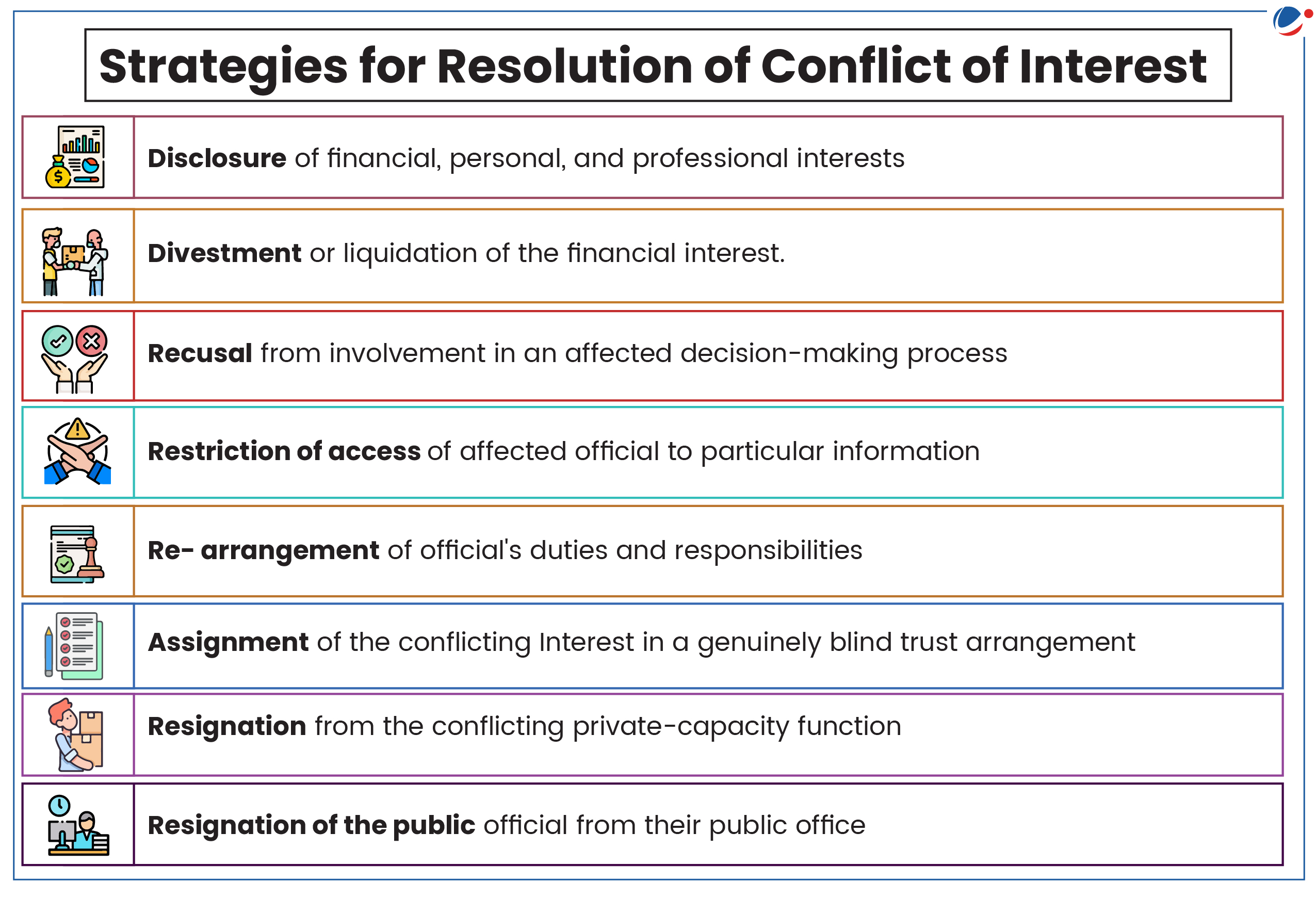Introduction
Recently, a US-based firm accused the Chairperson of SEBI of violating SEBI's Code of Conduct, leading to a potential conflict of interest. The situation presents a new potential for conflict of interests between civil servants or individuals in high-ranking positions, involving their private interests and public duties.
What is Conflict of Interest?
- Definition: A 'conflict of interest' involves a conflict between the public duty and private interests of a public official, wherein, public official's private interests can improperly influence the performance of his/her official duties and responsibilities (OECD)
- Conflict of Interests between public and the private sectors have become a major issue of public concern across the globe due to close forms of collaboration such as public private partnerships, self-regulation, interchanges of personnel, sponsorships, etc.
- Types of Conflict of Interest
- Actual: A situation where the official's private interest is in conflict with his/ her duty to perform in the public interest.
- e.g., a public official awarding a lucrative contract to a company owned by their family member.
- Potential: A situation where the official's private interest have not yet come into conflict with his/ her duty to perform in the public interest but may do so in the future.
- e.g., an academic researcher receiving funding from a corporation for a study related to that company's products.
- Perceived: A situation where the official's private interest looks as if it is in conflict with his/ her duty to perform in the public interest, although that is not the case.
- e.g., an elected official attending a private event hosted by a lobbyist, even if no direct favors are requested.
- Actual: A situation where the official's private interest is in conflict with his/ her duty to perform in the public interest.
Legal Framework to prevent Conflict of Interest in IndiaFor Public Servants
For Businesses
|
Way Forward to ensure effective resolution of Conflict of Interests
- Identification of Relevant Conflict of Interest: Establish procedures for identifying, managing, and resolving conflict of interest situations by establishment of effective, complete, and prompt disclosure process.

- Demonstrate Leadership Commitment: All public officials should keep their private interests in a manner that preserves public confidence and integrity of the organization rather than mere compliance in letter.
- Ensure wide publication and understanding of the Conflict of Interest policy: E.g. by publishing the Conflict of Interest Policy, giving regular reminders etc.
- Periodic review of 'at-risk' areas for potential conflict of interest situations: E.g., Inside information, gifts and other forms of benefit, outside appointments, activity after leaving public office, etc.
- Introduction of Cooling off period for public servants to prevent from revolving door: Cooling off period is the introduction of a minimum time interval restricting former public officials from accepting employment in the private sector.
- Revolving door refers to the movement of individuals from government to the private sector and from the private sector to government.
- Creation of independent of oversight bodies: Independent bodies or ethics commissions can be established to pro-actively monitor, investigate, and enforce conflict of interest rules.
- e.g., Several States in the US have Ethics Commission as guardians of the standards of conduct for public officials.
Conclusion
Addressing conflicts of interest is not merely a matter of legal compliance but a fundamental aspect of ethical governance. Public officials hold positions of trust, and safeguarding this trust requires robust mechanisms to prevent, identify, and manage conflicts of interest. By fostering a culture of transparency, accountability, and integrity, governments can ensure that decisions are made in the best interest of the citizens, thereby maintaining the legitimacy of public institutions and reinforcing the democratic principles.

Check your Ethical AptitudeYou are a senior official in a government regulatory body. Recently, one of your close friends, who run a successful private company, has approached you with a business proposal. He wants to start a new venture in a sector that your department regulates and seeks your guidance on navigating the regulatory landscape. He assures you that this is just friendly advice and offers you a small stake in the company as a token of appreciation for your expertise. Meanwhile, your department is in the process of formulating new policies that could significantly impact businesses in this sector. You possess insider knowledge about these upcoming changes. On the basis of the above case study, answer the following questions:
|




